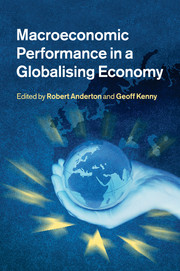Book contents
- Frontmatter
- Contents
- List of figures
- List of tables
- Notes on contributors
- Foreword by Jürgen Stark
- Acknowledgements
- 1 Globalisation and macroeconomic performance
- 2 The impact of globalisation on the euro area macroeconomy
- 3 Trade and foreign direct investment in business services: a modelling approach
- 4 Entry dynamics and the decline in exchange-rate pass-through
- 5 Does the exchange rate belong in monetary policy rules? New answers from a DSGE model with endogenous tradability and trade frictions
- 6 Globalisation and inflation in the OECD economies
- 7 Globalisation and euro area prices and labour markets: some evidence on the impact of low-cost countries
- 8 Monetary policy strategy in a global environment
- 9 Monetary policy in a global economy: past and future research challenges
- Index
- References
4 - Entry dynamics and the decline in exchange-rate pass-through
Published online by Cambridge University Press: 04 February 2011
- Frontmatter
- Contents
- List of figures
- List of tables
- Notes on contributors
- Foreword by Jürgen Stark
- Acknowledgements
- 1 Globalisation and macroeconomic performance
- 2 The impact of globalisation on the euro area macroeconomy
- 3 Trade and foreign direct investment in business services: a modelling approach
- 4 Entry dynamics and the decline in exchange-rate pass-through
- 5 Does the exchange rate belong in monetary policy rules? New answers from a DSGE model with endogenous tradability and trade frictions
- 6 Globalisation and inflation in the OECD economies
- 7 Globalisation and euro area prices and labour markets: some evidence on the impact of low-cost countries
- 8 Monetary policy strategy in a global environment
- 9 Monetary policy in a global economy: past and future research challenges
- Index
- References
Summary
Introduction
It is well known that the degree of exchange-rate pass-through (pass-through herein) to import prices is low. The evidence surveyed in Goldberg and Knetter (1997) suggests that an average pass-through estimate for the 1980s would be roughly 50 per cent for the United States, implying that, following a 10 per cent depreciation of the dollar, a foreign exporter selling to the US market would raise its price in the United States by 5 per cent. Moreover, there is substantial evidence that the degree of pass-through to US import prices has declined considerably since the early 1990s, to a level of about 30 per cent.
In Gust et al. (2010), we attempt to explain these findings by demonstrating that, in the presence of pricing complementarity, trade integration spurred by lower tariffs, transport costs and changes in relative productivities accounts for a significant portion of the decline in pass-through. In our framework, trade integration reduces pass-though because pricing complementarity induces an exporter to set a relatively high and variable mark-up when its costs are lower than its competitors and a low and unresponsive mark-up when its costs are relatively high. Pass-through thus declines solely because of mark-up adjustments along the intensive margin, as we abstracted from the entry and exit decisions of exporting firms.
In this paper, we instead examine how entry dynamics affect pass-through in the presence of declines in trade costs and changes in relative productivities across countries that help account for greater US openness.
Information
- Type
- Chapter
- Information
- Macroeconomic Performance in a Globalising Economy , pp. 93 - 119Publisher: Cambridge University PressPrint publication year: 2010
